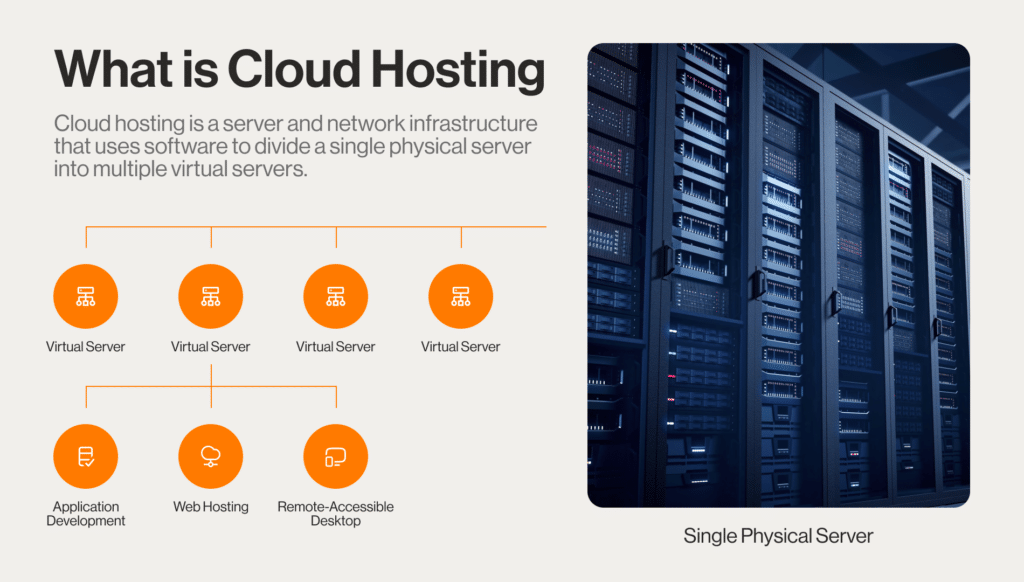As a small business owner, you’ll already understand how efficiency and cost-effectiveness are vital to your operation. What you may not yet know is how cloud services for small business can help you in both areas—and in myriad ways.
Technology has always played a part in keeping costs down and productivity up, and no matter what type of small business you have, the rise of cloud computing has proved to be a particular boom for businesses. With small companies, in particular, benefitting from the way cloud servers, hosted software solutions, and related technology boosts productivity, enables automation, and improves workflows.
In a time when more people are working remotely, operating a cloud server for small business and using other cloud-hosted solutions has obvious advantages for connecting your employees wherever they may be.
Let’s take a look at exactly what we mean by cloud services for small business, what types of cloud services there are, and the benefits offered by the best cloud providers for small business.
Click the links below to read ahead:
- What are cloud services for small business?
- What does cloud computing do, exactly?
- The main benefits of cloud servers
- How cloud computing saves you money
A modern communications system needs to be much more than phone calls and file sharing. It needs to provide workers with a better way of doing things.
💸 A modern communications system needs to be much more than phone calls and file sharing. It needs to provide workers with a better way of doing things.
What are cloud services for small business?
We’ve all heard people refer to “the cloud,” but it’s worth outlining what the terminology means.
Essentially, small business cloud solutions are any digital services hosted and made available via a cloud-based server. They store your company’s data, programs, and apps on that remote server instead of a hard drive or local storage device, allowing them to be accessed online from anywhere.
These cloud-applications for small business and other resources can, therefore, be retrieved by any employee with an internet connection, on any device—from a Mac to an Android smartphone to a Linux desktop to a Windows laptop—from anywhere in the world.
Cloud services for small companies are called that because the material is stored remotely in a virtual space, which is best visualized as a “cloud”. It’s an umbrella term that covers various types of cloud-based software for small business and related services, in areas such as cloud storage, cloud hosting, and cloud backup.
A cloud service for small business can also refer to solutions from email to ecommerce hosting, video conferencing to virtual phone services, and accounting to data analysis tools.
Chances are, you’ve already used some apps from cloud service providers for small business yourself—here are some common categories and products you might recognize:
File storage
- Dropbox
- Google Drive
- OneDrive
Communication
- RingCentral: An AI-powered business communications solution
Hosting
- Amazon Web Services (AWS)
- Digital Ocean (including WordPress)
- Microsoft Azure
Design
- Adobe Creative Cloud
- Flow
- Evernote
What does cloud computing do, exactly?
So, that gives you an idea of what cloud services are and which of your existing business tools fall under the umbrella. In which areas precisely can these solutions hosted on cloud-based servers for small business make an impact, though?
Cloud storage
It wasn’t so long ago that hard drives, memory cards, and USBs seemed the height of modern technology. There are many pitfalls to storing information in a physical way, however, especially for small businesses. For example, mobile devices used by remote workers might get damaged, lost, or stolen.
Another issue is that data is only accessible from the device on which it’s stored, meaning it’s not available to those working remotely. Similarly, data held by large servers in dedicated data centers can only be retrieved by logging in to the corporate network.
These problems can be avoided by using a small business cloud server or other cloud storage solutions. The way it works is that a cloud storage provider offers fixed-size server space to clients, who use it to store data of varying types.
Not only do you get full accessibility, you won’t have to worry about information being lost on a mobile device. In some cases, too, you can benefit from near unlimited storage capacity.
Some users maintain all apps and data on a public cloud, such as Microsoft Azure or Amazon Web Services (AWS). Others, meanwhile, use a hybrid model, keeping some information on private servers and the rest on the cloud.
How to set up a cloud server for small business
If you do go down the hybrid route for cloud storage, you’ll want to know how to implement your private cloud-based server for small business. Fortunately, it’s typically quite simple:
- Define your business needs – Make sure you know precisely what you need from your small business cloud server. Think about the size of your business, the data you need to store, and any security or compliance considerations.
- Choose the right cloud server provider – With a precise understanding of your needs, you can select the best cloud server provider for you. Make sure to consider things like uptime, customer support, scalability, and more.
- Sign up with your provider – Most providers of the best cloud-based servers for small businesses make it easy to subscribe. Make sure you select a pricing plan or model to suit your business and its budget.
- Configure your server – Once you’ve subscribed, you’ll get access to a control panel or dashboard to configure your small business cloud server. From there you can manage things like operating systems, software applications, and more.
Cloud backup
You might think it’s enough to save backup copies of important files to a hard drive, but imagine if something wiped out both your computer and the hard drive at the same time! That could be a total disaster for a small business with no other disaster recovery plan.
This is where cloud backup comes in as another example of vital cloud services for small businesses.
Also known as online backup or remote backup, the system automatically makes copies of your files or databases and stores them in the cloud. This way, the information remains safe and accessible even if your equipment fails or is lost or stolen.
Cloud backup services such as Carbonite Safe and SpiderOak One use industry-standard encryption to protect your data. Meanwhile, cloud service providers like RingCentral protect your data with automatic backups and SSL encryption, among other enterprise-grade security measures.
It can be more cost-effective to use a cloud backup service than an in-house data backup operation. The cloud is scalable, so even as a company’s data grows, it can still be backed up—but organizations should be wary of increased costs as data volume increases.
Cloud hosting
Cloud-based hosting provides virtual server space for each user, rather than the traditional web-hosting method of using physical server space. A network of connected servers hosts your website or app, giving you increased flexibility and scalability.
Where traditional web hosting can only provide limited bandwidth, cloud hosting can be adjusted to accommodate high volumes of traffic or seasonal demands. Even more importantly, downtime is rare, because multiple servers are handling each hosted site.
These are both huge advantages for smaller businesses, which can’t afford to lose customers due to slow connections, hardware failures, or lengthy downtimes. Especially as downtime costs small businesses an estimated $427 per minute!
Another bonus is that with cloud hosting, pay-as-you-go pricing is common. Businesses pay only for the resources they actually use, instead of paying the flat rate usually charged by traditional web hosts:

Businesses can choose between shared hosting and dedicated hosting, and you will need to figure out which is the most suitable option for you.
Shared hosting is where the service provider hosts pages for multiple websites from a single web server. It’s the most economical option because the server’s operating costs are distributed across multiple users, so it’s attractive to small businesses with a limited budget.
However, the disadvantage is that your website may experience slowdowns because you’ll have a smaller amount of bandwidth at your disposal. The fact that other sites are using the same server also presents a slightly higher security risk, which is something you have to weigh against the pros.
Dedicated hosting delivers the entire server and its resources just to you, meaning less delay, more bandwidth, and precise control. Of course, the trade-off is that it’s more expensive.
The main benefits of cloud servers, software & other virtual solutions for small business
You might think that only large global businesses need cloud computing, but it’s especially suitable for smaller companies and startups. That’s because small businesses often don’t have the capacity for storage maintenance or the budget to cover hardware maintenance costs. They’re also more likely to rely on remote workers.
It can be expensive and insecure to keep data on-premises, but the best cloud software for small business means you don’t have to buy, set up, and look after expensive information management technology and infrastructure.
You’ll also have peace of mind, knowing your precious data is as secure as it can be. This is particularly important for small businesses, which could be ruined by a catastrophic data loss.
That’s not all, either, cloud server and software benefits also include the following:
It makes data more accessible
This is a big one—cloud computing means you and your employees can access the data and programs you need from literally anywhere, as long as there’s an internet connection.
This is invaluable to a small business without a physical workspace, and it’s also useful for workers who are temporarily away from the office.
Employees can check their email on any computer or device, store and edit files, and use the programs and applications they’re familiar with. The technology even optimizes cloud computing for mobile apps.
As we said earlier, cloud computing also enables users to back up their files so that they are immediately available in the event of a hard drive crash.
It gives you multiple ways of communicating
When all or most of your employees work remotely—they may even be scattered across the globe in some businesses—it can be difficult to maintain a sense of cohesion and connectivity.
Cloud computing addresses this by making the same real-time data and programs available to everyone, meaning physical distance doesn’t hinder efficiency or company unity. Project management is made easier, and there are benefits for online training, too.
File sharing and syncing helps maintain consistency between employees and departments—especially when it comes to job sharing or shift working—as an employee can pick up a task right from where their colleague left off.
Such seamless communication and collaboration is made possible by the best small business cloud solutions. RingEX® is one such cloud solution that helps you manage all your communication channels like messaging, video conferencing, and phone in one place to help teams and businesses communicate more effectively:
Even if you need to step away from your computer, you can still talk to your colleagues and clients. How? Well, the RingCentral app has a feature that lets you flip a call from your computer to your phone—without interrupting the conversation:

Not only that, you can also conveniently switch a call from being voice-only to a video call—for those more complicated conversations that need some face-to-face time:

It lets you work together, from anywhere
We’ve touched on this already, but it’s worth underlining just how beneficial cloud services can be for remote working in small businesses.
With access to data from any smartphone, tablet, laptop, or desktop, there’s no need for employees to be at the office in person. This eliminates the need for commuting, so you can save time, cut costs (either for the worker or for the boss who pays their travel expenses), and reduce pollution from traveling.
Using the cloud also means that if and when the company hires new staff, there will be no need to purchase additional personal computers. Instead, a new unique login would be set up for each new employee. Business owners can help set up new users, and help them onboard—right from their mobile devices. Easily add or remove users as needed in a matter of a few minutes during busy seasons.
Meanwhile, employees themselves no longer have to worry about the security or storage capacity of the devices they use, especially with the encryption tech used by RingCentral. And having fast, easy access to everything they need will help them get the job done quicker and feel happier about doing it.
It lets you scale and grow more easily
Your business might be small at the moment, but hopefully it will grow! And if you’re thinking about scaling up, it’s much faster and more cost-effective to do so using the cloud.
For instance, as we said in the previous section, any new staff will simply require login credentials to be added to the network. Your cloud service provider may charge a fee for adding new users, but this will be small compared to the cost of setting them up with a new computer.
If the growth of your business necessitates software with additional functionality, cloud service providers like RingCentral can also organize this quickly and seamlessly for a nominal usage fee.
It’s more cost-efficient
The nominal extra fees mentioned above are part of what makes cloud computing so cost-effective for smaller businesses.When you use cloud software, such as a small business phone service, the software’s updates and upgrades are all typically handled by the cloud service provider. That saves you a ton of time because you don’t have to deal with the upkeep and maintenance of these tools.
The cost of a cloud server for small business: Or how cloud computing saves you money
That’s all very well, you may say, but what’s it going to cost my business? Good news, in general, cloud services for small businesses actually save time and money. Here’s how:
It reduces the hardware space you need
An in-house server would take up a lot of space, not to mention costing money to build and maintain (plus the associated concerns about security).
With the best cloud server for small business, the hosting company owns and maintains the required hardware, so you won’t have to make space on your premises. This is especially good news for smaller businesses or those without a physical workplace.
You will also save a ton of storage space on desktops or mobile devices, which is handy when the amount of data you need to store is growing constantly. Cloud storage services mean there’s no need to plug in bulky external hard drives or easy-to-lose flash drives.
It makes your team more flexible and mobile
The cloud’s benefits for remote working mean you could dispense with the need for premises at all—or run a smaller office with hot desking (where multiple employees may be using the same desk during different shifts). Either way, there won’t be so much expenditure on office furniture, rental fees, business rates, and utility bills.
Many companies also encourage employees to use their own mobile devices these days, and this fits perfectly with the fact that cloud services are accessible from any device—as long as security measures are taken into account, of course.
Without cloud computing, organizations would likely require a large IT department to manage installation, configuration, maintenance, and security of programs and applications. This would certainly be a struggle for small businesses.
It saves you time—and effort
Efficiency saves time, and saving time saves money. As well as giving all employees easy access to stored business data, there are a range of cloud computing services that make everyday tasks so much quicker and easier.
From cloud email services (such as Gmail) to cloud-based versions of existing software (like QuickBooks accounting software) and cloud-based PBX systems (such as RingCentral’s), you’ll have swift access to the latest and most efficient business products and innovations.
The labor-saving benefits of cloud services will often be enough to offset some of the additional costs.
It boosts productivity
A more efficient system has positive knock-on effects for employee productivity, as there’s no time wasted in waiting for web pages to load, documents to save, or emails to ping through.
Cloud computing also enables you to upgrade software more quickly, because software companies can sell and install their products digitally and remotely rather than via discs or flash drives. Using the latest versions will definitely increase productivity.
Many employees are happy to work remotely, as the no-commute, work-from-anywhere atmosphere can improve their work/life balance. Staff can be recruited from anywhere in the world—so you could have virtual outposts of your business in different time zones.
Sounds complicated? Not at all. It simply means that key employees such as your sales team, web maintenance team, and customer service personnel can be available 24/7 and connected on the same cloud system so your teams can achieve MORE (think of it like a digital HQ!).
What’s more, integrations, like the more than 300 pre-built by RingCentral are ideal for boosting productivity still further. You can integrate RingCentral’s collaboration tools directly into your CRM system, for instance, to remove all that pesky app-hopping and automate tedious tasks.
Cloud services for small business can help you punch above your weight
A cloud server for small business or a related virtual software tool is a future-proof investment that can optimize, protect, and grow your small business. Carry out thorough research into the various cloud service options available, so that you can pick the right fit for your company.
To find out more, including how RingCentral may be able to help your business outstrip its rivals, get in touch today.
Originally published Jun 05, 2024, updated Jul 24, 2024






